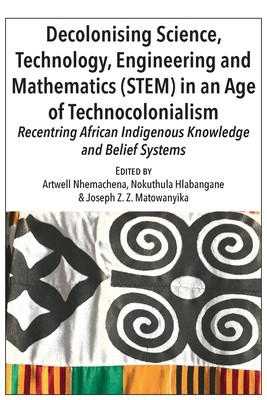
- We will send in 10–14 business days.
- Publisher: Langaa RPCID
- ISBN-10: 9956551864
- ISBN-13: 9789956551866
- Format: 15.2 x 22.9 x 1.9 cm, softcover
- Language: English
- SAVE -10% with code: EXTRA
Decolonising Science, Technology, Engineering and Mathematics (STEM) in an Age of Technocolonialism (e-book) (used book) | bookbook.eu
Reviews
Description
Positing the notions of coloniality of ignorance and geopolitics of ignorance as central to coloniality and colonisation, this book examines how colonialists socially produced ignorance among colonised indigenous peoples so as to render them docile and manageable. Dismissing colonial descriptions of indigenous people as savages, illiterate, irrational, prelogical, mystical, primitive, barbaric and backward, the book argues that imperialists/colonialists contrived geopolitics of ignorance wherein indigenous regions were forced to become ignorant, hence containable and manageable in the imperial world. Questioning the provenance of modernist epistemologies, the book asks why Eurocentric scholars only contest the provenance of indigenous knowledges, artefacts and scientific collections. Interrogating why empire sponsors the decolonisation of universities/epistemologies in indigenous territories while resisting the repatriation/restitution of indigenous artefacts, the book also wonders why Westerners who still retain indigenous artefacts, skulls and skeletons in their museums, universities and private collections do not consider such artefacts and skulls to be colonising them as well. The book is valuable to scholars and activists in the fields of anthropology, museums and heritage studies, science and technology studies, decoloniality, policymaking, education, politics, sociology and development studies.
EXTRA 10 % discount with code: EXTRA
The promotion ends in 19d.21:15:18
The discount code is valid when purchasing from 10 €. Discounts do not stack.
- Publisher: Langaa RPCID
- ISBN-10: 9956551864
- ISBN-13: 9789956551866
- Format: 15.2 x 22.9 x 1.9 cm, softcover
- Language: English English
Positing the notions of coloniality of ignorance and geopolitics of ignorance as central to coloniality and colonisation, this book examines how colonialists socially produced ignorance among colonised indigenous peoples so as to render them docile and manageable. Dismissing colonial descriptions of indigenous people as savages, illiterate, irrational, prelogical, mystical, primitive, barbaric and backward, the book argues that imperialists/colonialists contrived geopolitics of ignorance wherein indigenous regions were forced to become ignorant, hence containable and manageable in the imperial world. Questioning the provenance of modernist epistemologies, the book asks why Eurocentric scholars only contest the provenance of indigenous knowledges, artefacts and scientific collections. Interrogating why empire sponsors the decolonisation of universities/epistemologies in indigenous territories while resisting the repatriation/restitution of indigenous artefacts, the book also wonders why Westerners who still retain indigenous artefacts, skulls and skeletons in their museums, universities and private collections do not consider such artefacts and skulls to be colonising them as well. The book is valuable to scholars and activists in the fields of anthropology, museums and heritage studies, science and technology studies, decoloniality, policymaking, education, politics, sociology and development studies.


Reviews